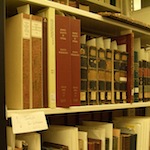A few months back, we set out to ingest the Hirshhorn Museum Library Audio Archive from our old site into our new, Drupal-run site. The collection include audio clips of interviews with artists as well as lectures and other events held at the museum from 1969-2004. With the use of views and panels, we were able to set up the Hirshhorn audio page in a similar layout to the old site. With the use of feeds import, we were able to ingest all of the information about each and every lecture. We converted the links of the media files to audio players so that you never have to leave the page you are on in order to hear the supporting audio. It was a great opportunity to flex my Drupal muscles.
Tag: Drupal
Hello all, My name is Becca and I am the new IT Specialist here at the Smithsonian Libraries. I work for Joel doing various website updates and upgrades and just generally making things look awesome. I am here, on the blog today, to tell you about DrupalCon Portland.

In an earlier post in December 2011, we announced the release of the Taxonomic Literature II (TL-2) search tool that allows anyone to search and read its fifteen volumes. One of the things we mentioned in that post was our plans to open the TL-2 dataset to searchability and reuse by providing it as Linked Open Data (LOD).
This time, we’ll discuss details of our plans for Linked Open Data, some of the data we are extracting, and the challenges in creating data for a linked open data set.
The past couple of months in the web-development world have been spent building a foundation for a method of presenting digitized book-like things on the Smithsonian Libraries website. This has been an interesting time creating a home for the history, art, and culture part of our scanned collections.
On September 30, two of the Smithsonian Institution Libraries' staff attended the American Library Association's LITA (Library and Information Technology) National Forum. The three-day conference was titled "Rivers of Data, more »
On February 7-10, Web Developer Joel Richard attended the Code4Lib conference held at Indiana University in Bloomington, IN. Sub-freezing weather aside, the conference was a hotbed of software developers, metadata experts and computer people getting together to discuss their latest work in developing software, websites, tools and technologies that support the mission of libraries across the country and the world!

